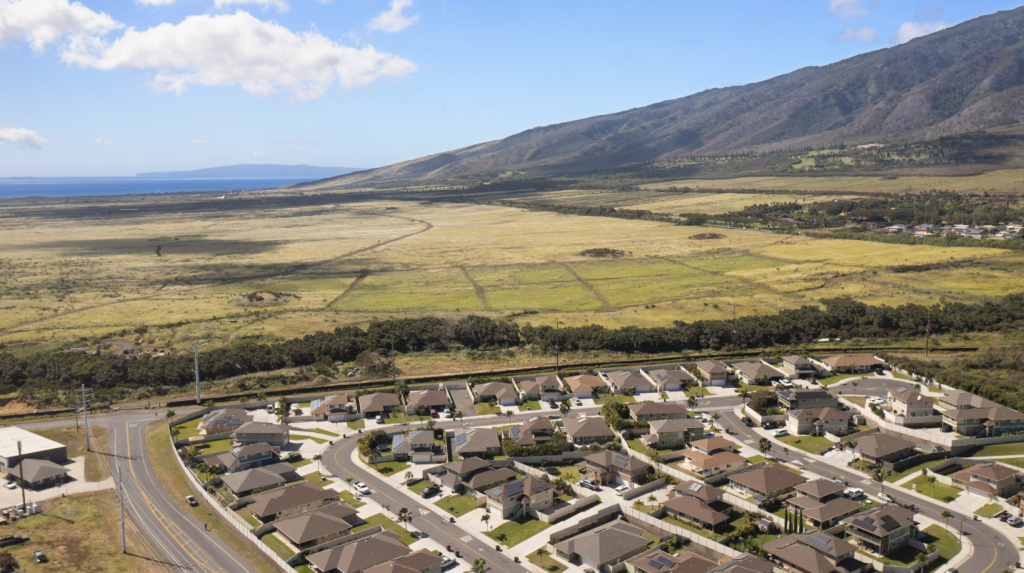Bill to lower Maui County affordable housing sales guidelines narrowly advances in council

Despite opposition from developers, a plan that promises to make affordable homes more affordable moved one step closer to reality at Maui County Council recently.
In a divided 5-4 vote, with Council Members Alice Lee, Tasha Kama, Yuki Lei Sugimura and Mike Molina dissenting, council approved Bill 107 on first reading last week. It now advances to second and final reading.
Bill 107 would establish new methods for sales price guidelines for affordable housing. If enacted, it would change the affordable housing sales prices to limit the total housing costs —including principal, interest, taxes, insurance, mortgage insurance — to 31% of gross annual income.
Council Member Gabe Johnson, who introduced the bill, said the plan would result in a 22% decrease in affordable housing sales prices.
The measure, though, has been questioned in various council meetings over months of discussion.
Molina said the plan is risky and could unintentionally disincentivize housing.
“Maybe I’ve missed something, but I don’t know there’s been any developers who have come out to support this yet,” Molina said at the council Affordable Housing Committee meeting Aug. 18. “We’ve heard their concerns; we’ve had some suggestions made. But these guys are part of the equation, whether we like them or not, they have a bottom line, they have to stay in business. So I would hate to pass something with good intentions that could unfortunately create a disincentive to build because we can’t twist their arms and tell them they gotta build.”
For-sale affordable housing developers, including Everett Dowling, Howard Kihune Jr. and Lawrence Carnicelli, have testified that the measure will actually hinder affordable housing.
Developers said the math doesn’t pencil out because it costs more to build a home than the price for which the proposal said it should be sold. If the county provides a subsidy to make up the difference, it needs to be done in a way that doesn’t create undue risk in a development process that takes years.
Dowling during the Aug. 18 meeting said his company is looking at a project with 100 units — 25 affordable and 75 market. If prices for affordable homes go down, the market homes would have to increase, which would “squeeze out” middle-class residents, he said.
“This would force developers to increase prices of market rate housing to subsidize the affordable housing,” he said.
Instead, Dowling suggested the county use the Affordable Housing Fund to pay for infrastructure, which would help bring down project costs.
Kihune Jr. on Aug. 18 also said he’s opposed to the measure and that the real issue is making it easier for developers to build homes.
“I beg someone to tell me how many projects we’ve got single-family, fee-simple being built right now, how many units?” he asked. “This council, this committee, has constantly said we’re going to do 5,000 units in five years. Right now we’re in year two — going on year three. The only thing I see is low-income housing tax credit rentals for the truly below affordable workforce. That’s it. I don’t see any affordable workforce housing single-family units, fee simple, on the market other than the projects we’re doing ourselves right now.”
“But right now we’re cutting out our workforce, just like Everett Dowling had mentioned,” Kihune Jr. added.
Bill 107 would also create a program that allows for developer and homebuyer subsidies to bring the cost of the affordable homes down. The new equation aligns the county’s price guidelines with Federal Housing Administration loan standards.
A recent news release from Maui County Council said the council’s Affordable Housing Committee addressed community concerns regarding possible financial challenges for developers.
“According to Affordable Housing Committee Report 22-81, the committee addressed community concerns regarding possible financial challenges for developers,” the release said. “The report states that it was ‘noted that affordable housing subsidies and potential forthcoming legislation may help to reduce the cost of development.’”





_1768613517521.webp)








